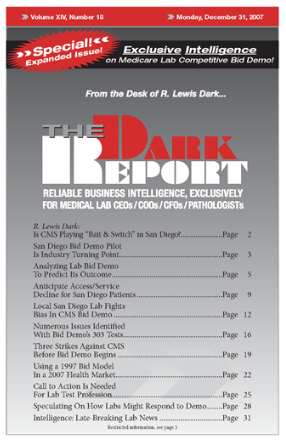CEO SUMMARY: After two decades of study and preparation, the Centers for Medicare & Medicaid Services (CMS) is pushing the laboratory profession toward the first pilot site in the Congressionally-mandated Medicare Clinical Laboratory Services Competitive Demonstration Project. Designed to drive down the price Medicare pays for laboratory tests, the plan CMS described at the December …
Analyzing Lab Bid Demo To Predict Its Outcome Read More »
To access this post, you must purchase The Dark Report.


